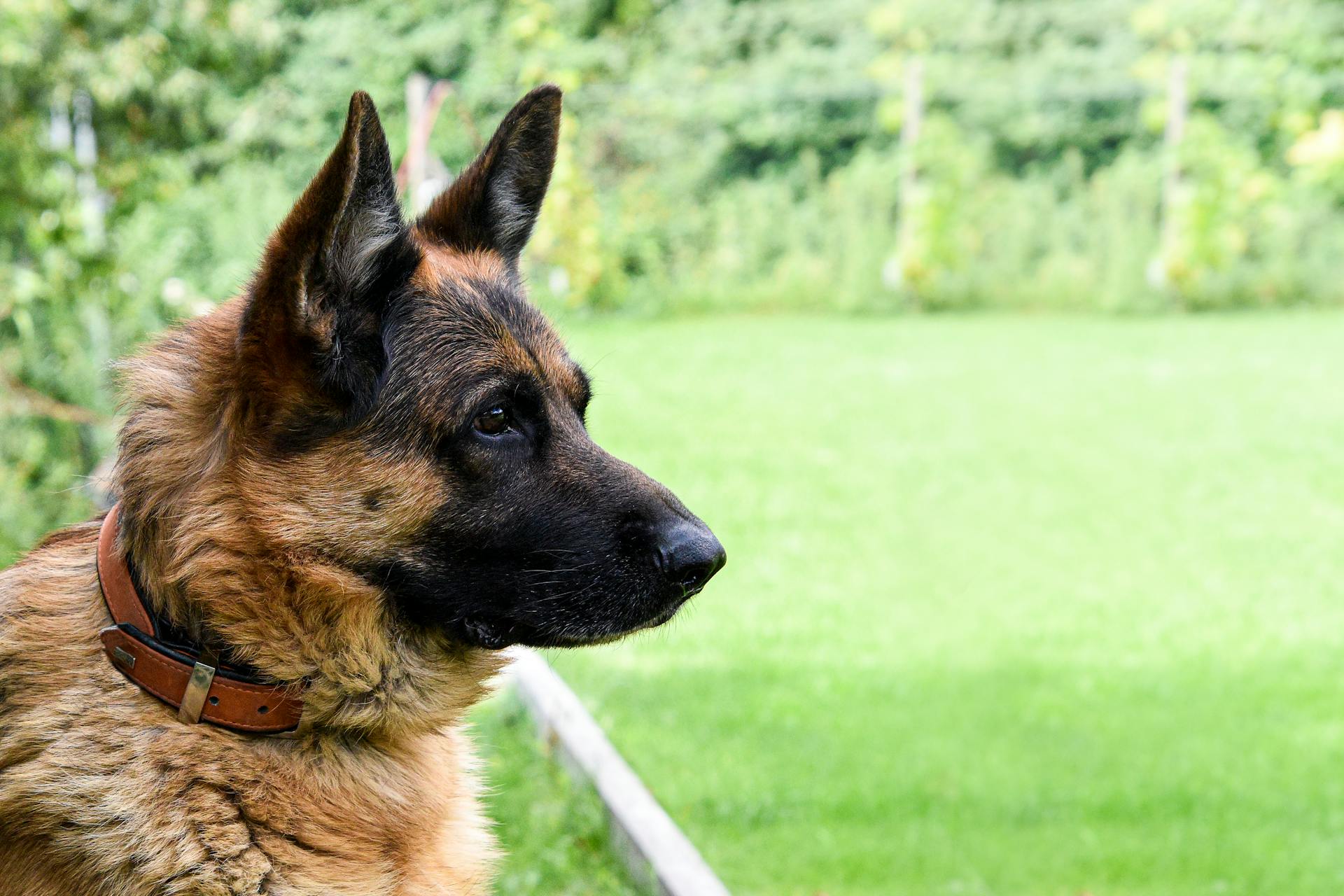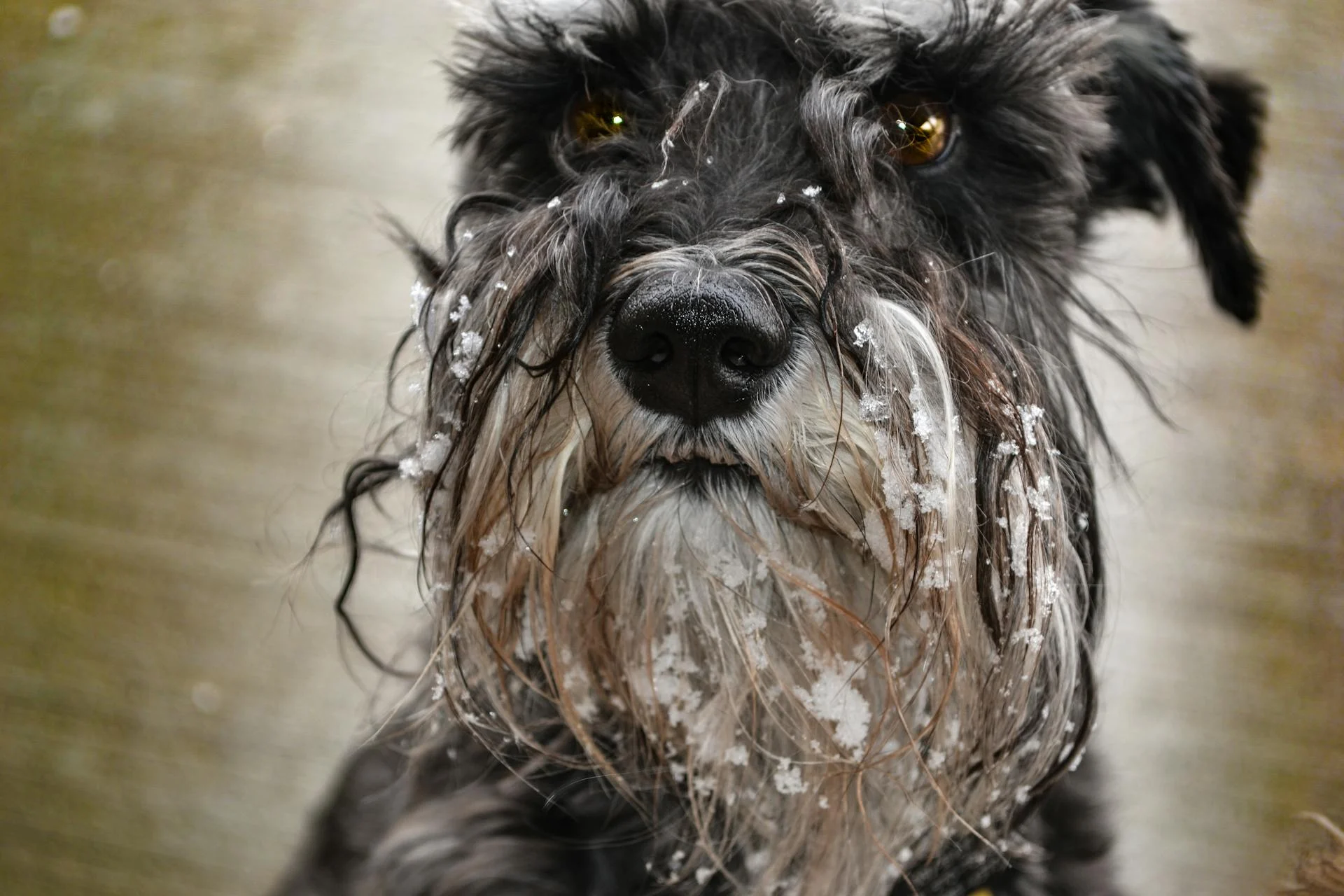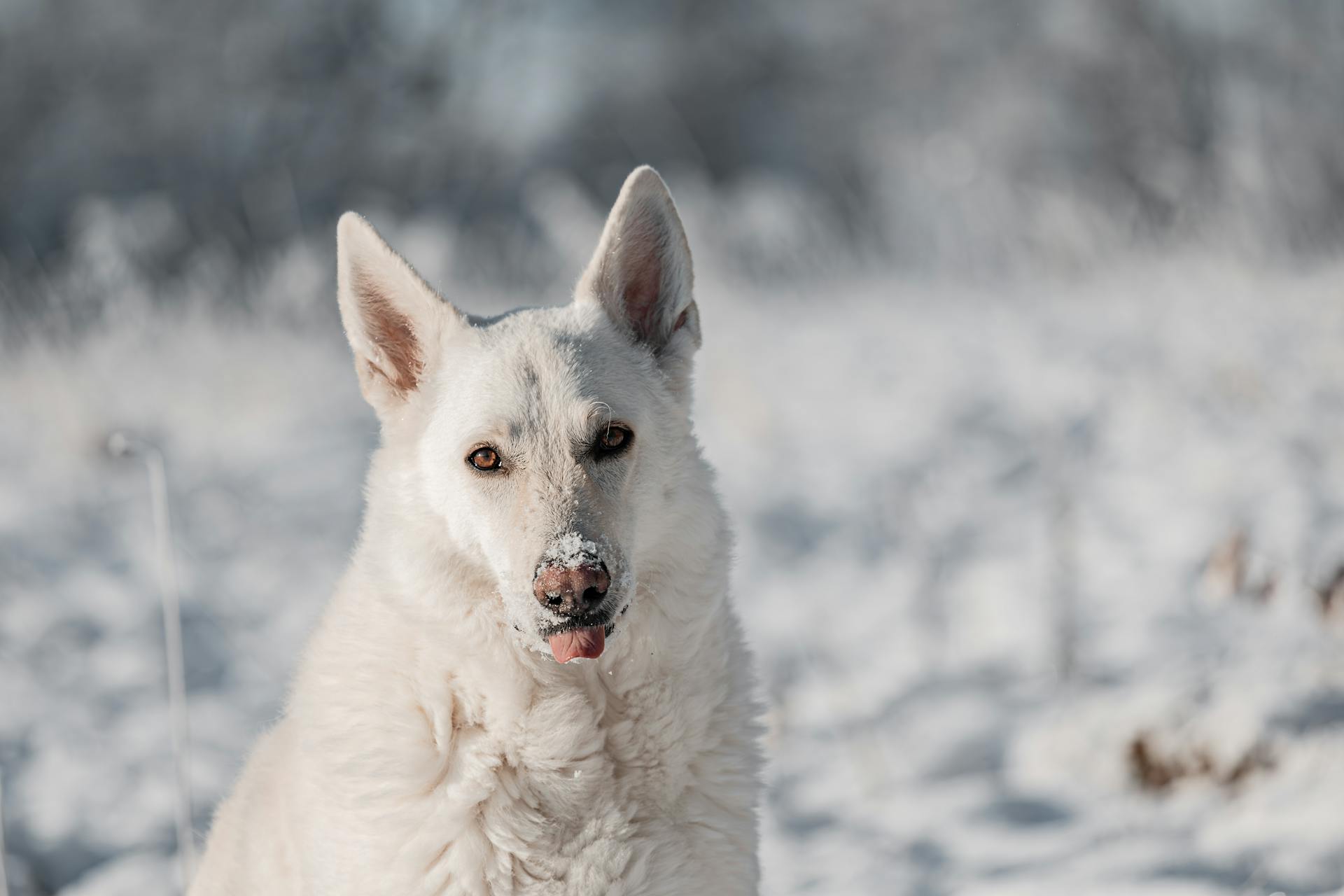
Owning a White King Shepherd can be a life-changing experience, but it's essential to understand their needs and characteristics before bringing one home.
White King Shepherds are a rare and majestic breed, with a thick double coat that sheds heavily, especially during shedding season.
They require regular grooming to prevent matting and tangling, and a daily brushing session is a must.
These dogs are highly intelligent and active, so they need plenty of exercise and mental stimulation to prevent boredom and destructive behavior.
In terms of size, White King Shepherds are a large breed, with males weighing between 100-120 pounds and standing as tall as 26-28 inches at the shoulder.
Their calm and gentle nature makes them an excellent choice for families with children, but early socialization is crucial to ensure they grow into confident and well-adjusted adult dogs.
Worth a look: Dogs Breeds That Start with B
Temperament and Intelligence
The white King Shepherd is renowned for their even and loving disposition, making them a great addition to any family.
They're incredibly smart, with a keen problem-solving ability that makes training a breeze. They're quick learners and eager to please, which makes them a joy to work with.
These dogs are basically fearless, stepping in the path of danger to protect their families without hesitation. They're strong and confident, but not aggressive.
Their intelligence can work against them if they don't receive enough stimulation, so be prepared to provide plenty of mental and physical activity. They'll happily spend hours mastering new commands and learning new tricks.
Their calm temperament makes them a great therapy dog, and they're also known to be very loyal to their families. They'll want to be by your side at all times, and they'll make sure to keep you company.
King Shepherds are known to be very patient, and they can make the perfect family pet for those with children. They're gentle and loving, but still formidable guard dogs.
Pet Compatibility
If you're considering bringing a White King Shepherd into your home, it's essential to think about pet compatibility. They love to play with other dogs, and it may take another dog to fully tire them out.
Socialization is key when introducing a King Shepherd to other pets. They can be welcoming to cats and other small pets, but it's always better if they've been raised with them.
King Shepherds usually get along well with other pets, especially if they're socialized from a young age. They're known to live peacefully with other dogs and even cats.
To ensure a smooth transition, it's best to minimize interactions at first and make introductions gradual. This will help prevent stress for both pets.
Here are some general guidelines for introducing a King Shepherd to other pets:
Remember, every dog is different, so it's crucial to observe your White King Shepherd's behavior and adjust your approach accordingly.
Owning and Caring
Owning a White King Shepherd requires a lot of effort and dedication, but it's a rewarding experience for those who are willing to put in the work.
These dogs need around 60 minutes of exercise a day, which can be broken down into shorter sessions throughout the day. They also enjoy interactive games with their family, so be prepared to play tug of war or fetch with your White King Shepherd on a daily basis.
A larger home with a spacious backyard is essential for a White King Shepherd, as they need room to roam and exercise. They also require fresh air and space to protect their territory.
Consider reading: Do Border Collies Need to Be Groomed
Owning Essentials
Owning a King Shepherd requires being aware of their unique needs and characteristics. They are a rare breed, and many people have never owned one before.
King Shepherd puppies can be quite energetic and destructive, so be prepared for a lively household. They tend to behave like German Shepherd puppies, chewing on anything they can find and bouncing off the walls.
You should start obedience training and socialization as soon as possible to lay the groundwork for a well-mannered dog. The sooner you begin, the better-behaved the animal will be later in life.
King Shepherd puppies grow rapidly and need plenty of nutrition to support their development. They require a balanced diet to stay healthy and strong.
It's essential to find a reputable breeder who can provide you with registration papers and health certificates. Be wary of puppy mills that may be taking advantage of the breed's popularity.
King Shepherds are big dogs, and their joints develop slowly, so you should wait until they're at least a year and a half old before asking them to do any high-impact activities. This will help prevent injuries and ensure their long-term health.
The average price of a King Shepherd puppy is around $1,500, but be prepared to spend a bit more to ensure you're getting a healthy pup from a reputable breeder.
For your interest: Embark Breed and Health Dog Dna Test Stores
Exercise and Living Conditions
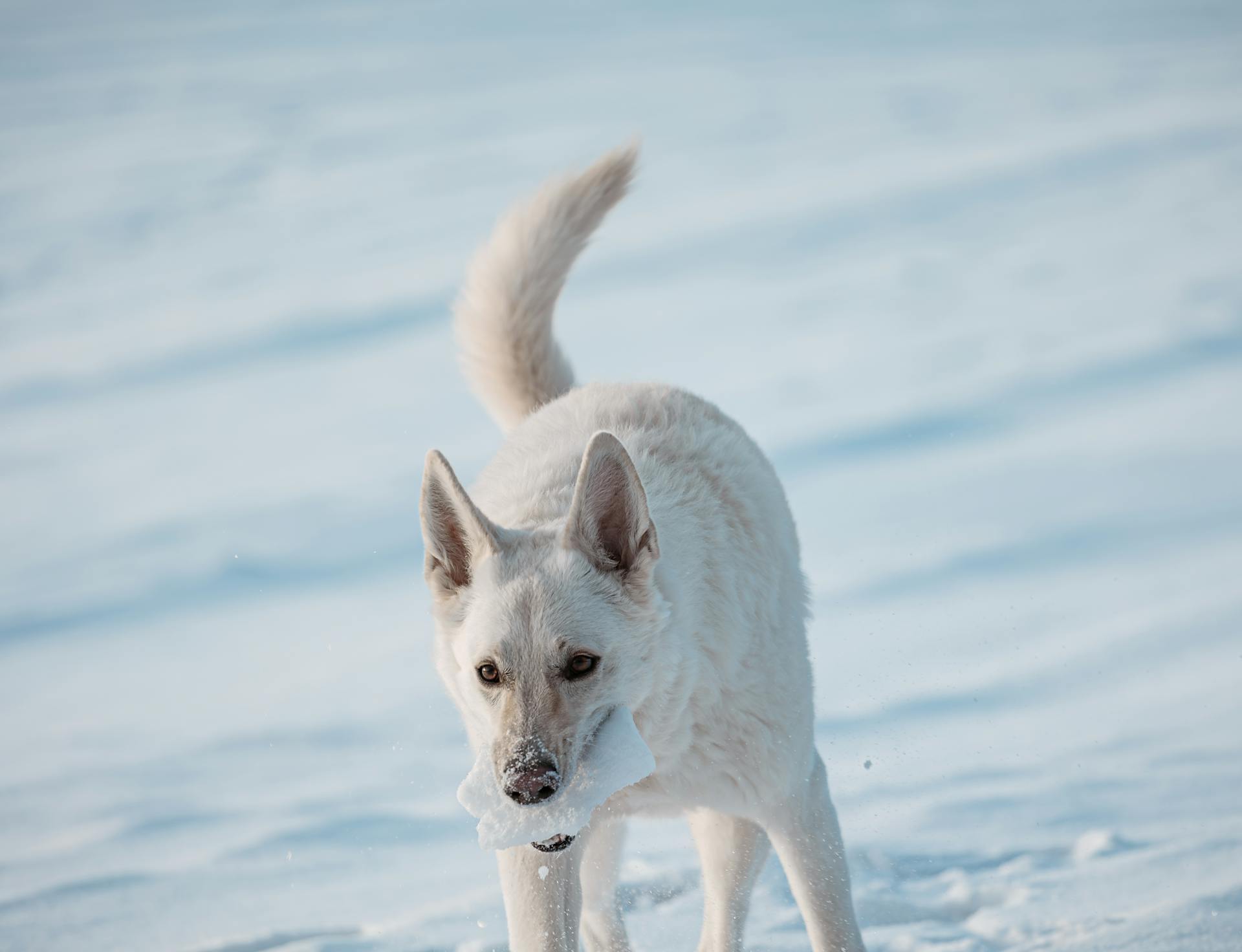
Owning a King Shepherd means being prepared to provide a lot of exercise and attention to their needs.
A King Shepherd needs at least an hour of exercise a day, which can include a brisk walk, playing fetch, or working on their obedience training.
Their brains need just as much work as their muscles, so obedience work, agility training, puzzle toys, or games like hide-and-seek are all great ways to keep them mentally stimulated.
If you live in an apartment, you can still give your King Shepherd all the exercise they need, but you'll have to be more creative and find ways to provide them with physical and mental stimulation.
A King Shepherd is suited to a larger home with a larger backyard, as they need space to roam and protect their estate.
They should be kept on a leash in public places due to their curious and inquisitive nature, and a 6-foot fence that they cannot break through is recommended to prevent escape.
For another approach, see: Dog Breeds That Don't Need Grooming
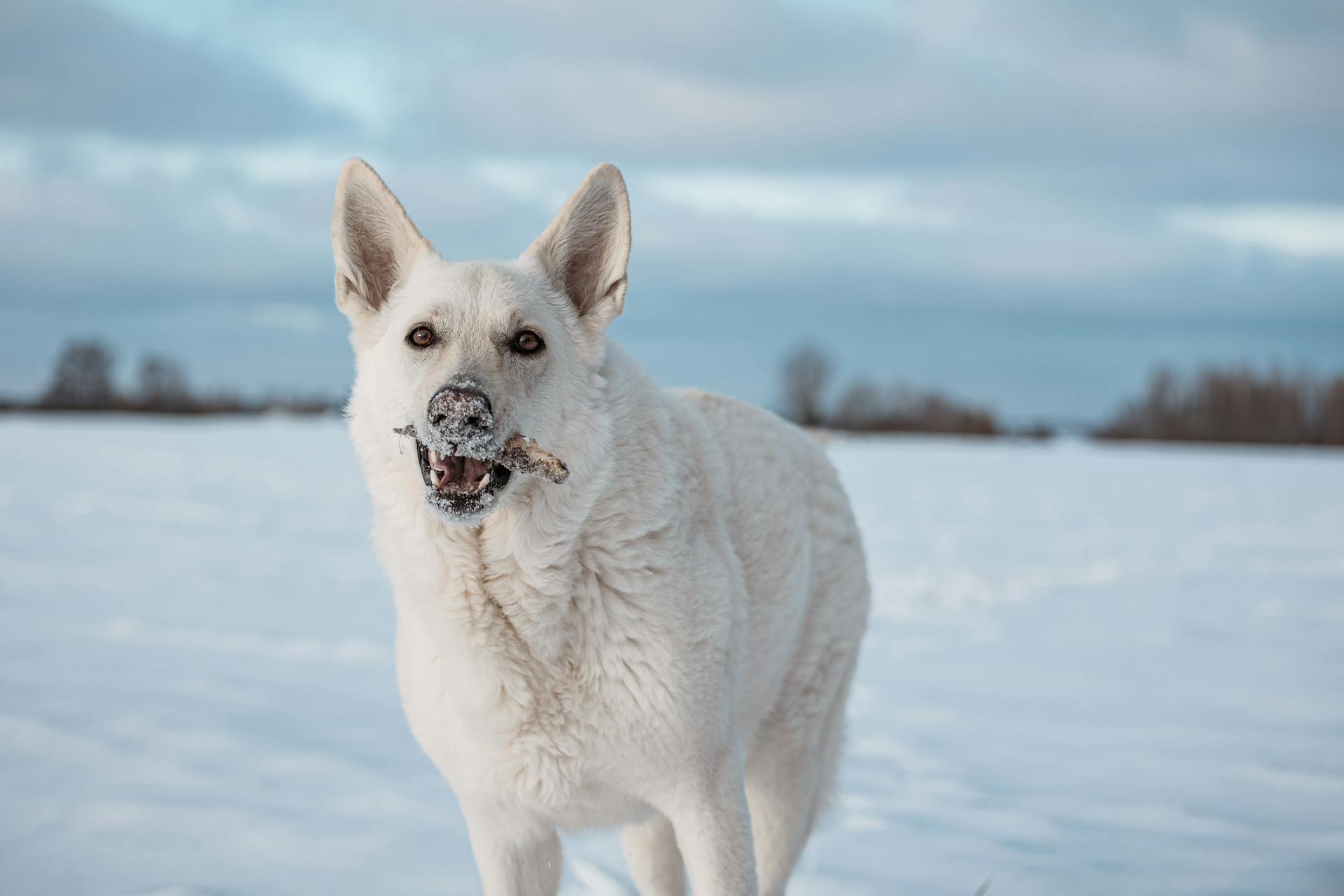
Providing a consistent and varied exercise regimen is crucial for maintaining a King Shepherd's overall happiness and longevity, and this should include a combination of physical and mental stimulation.
A King Shepherd's exercise routine should aim for at least an hour of physical activity each day, which can include long walks, play sessions in a secure yard, or even swimming if they enjoy water.
Discover more: How Much Exercise Do Border Collies Need
Health and Nutrition
The average lifespan of a King Shepherd is between 10 and 11 years. They are slightly healthier than some other breeds, but they can still inherit some health issues from their German Shepherd ancestors.
Hip Dysplasia is a common concern in King Shepherds, where the hip joint forms abnormally, causing pain when walking. Gastric Torsion, also known as Bloat, is another major concern, where the stomach twists while eating, which can be life-threatening.
To minimize the risk of Gastric Torsion, feed your King Shepherd multiple meals a day, and not immediately before or after exercise. A mix of wet dog food and kibble, and using a slow feed bowl, can also help slow down eating.
Intriguing read: Hip Problems in Border Collies
Health and Conditions
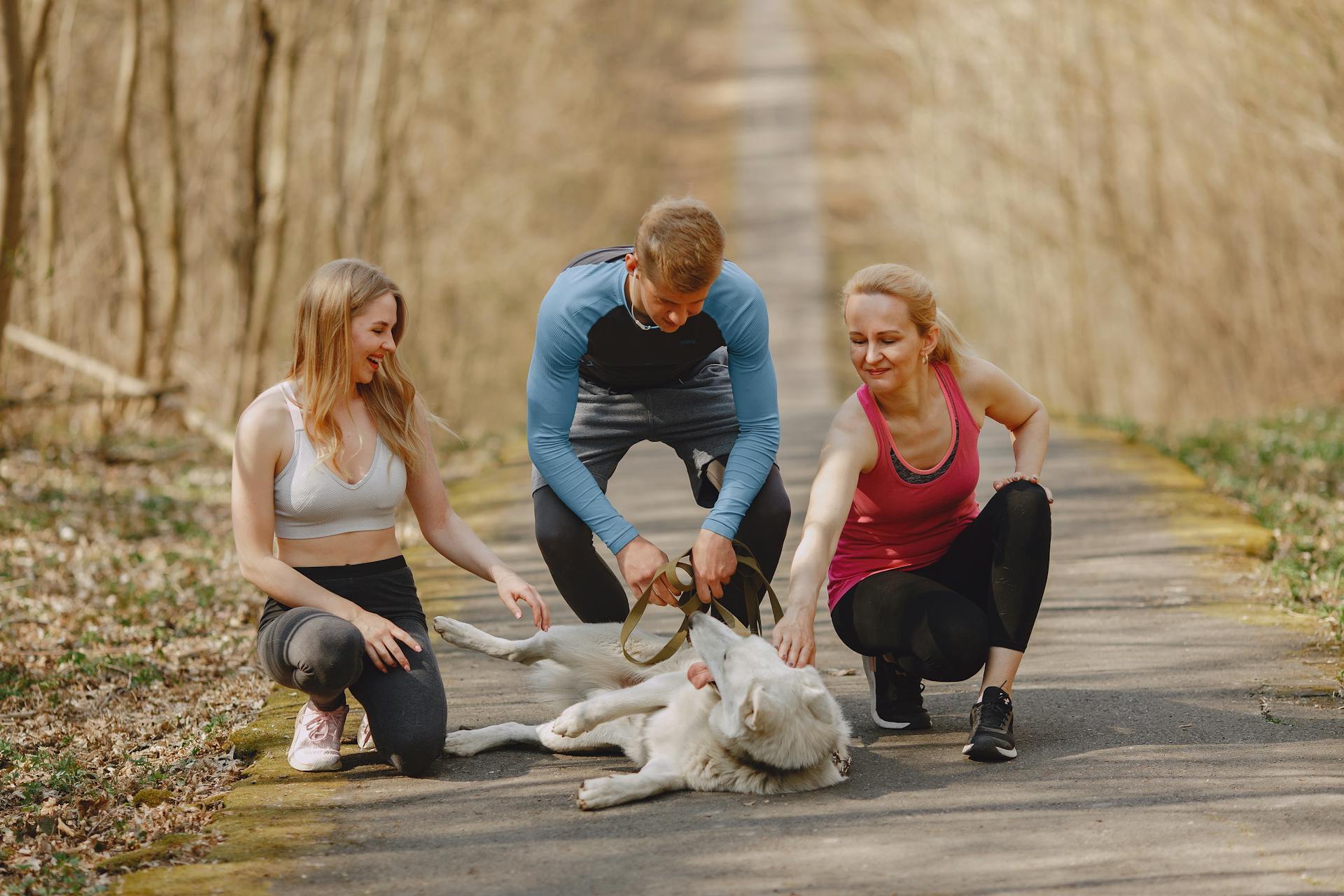
King Shepherds are generally healthier than German Shepherds, but they're not immune to health issues. They can be prone to bloat, a life-threatening condition that requires immediate veterinary attention.
Large dogs like King Shepherds are more susceptible to joint problems, such as hip and elbow dysplasia, which can lead to arthritis.
Allergies are another common issue in King Shepherds, and they can be triggered by environmental factors or certain foods.
Here are some potential health concerns in King Shepherds:
- Bloat
- Hip and elbow dysplasia
- Degenerative myelopathy
- Hypothyroidism
- Von Willebrand's disease
- Heart disease
With proper care, King Shepherds can live for 10-14 years, which is relatively long for dogs of their size. Regular veterinary check-ups can help detect potential health issues early on, and treatment plans can be implemented to manage them effectively.
Nutrition
The King Shepherd is a giant of a dog, and it needs a diet that's just as impressive. They'll typically require 4 cups of food every day, which can be divided into at least two sittings to alleviate the risk of Gastric Torsion.
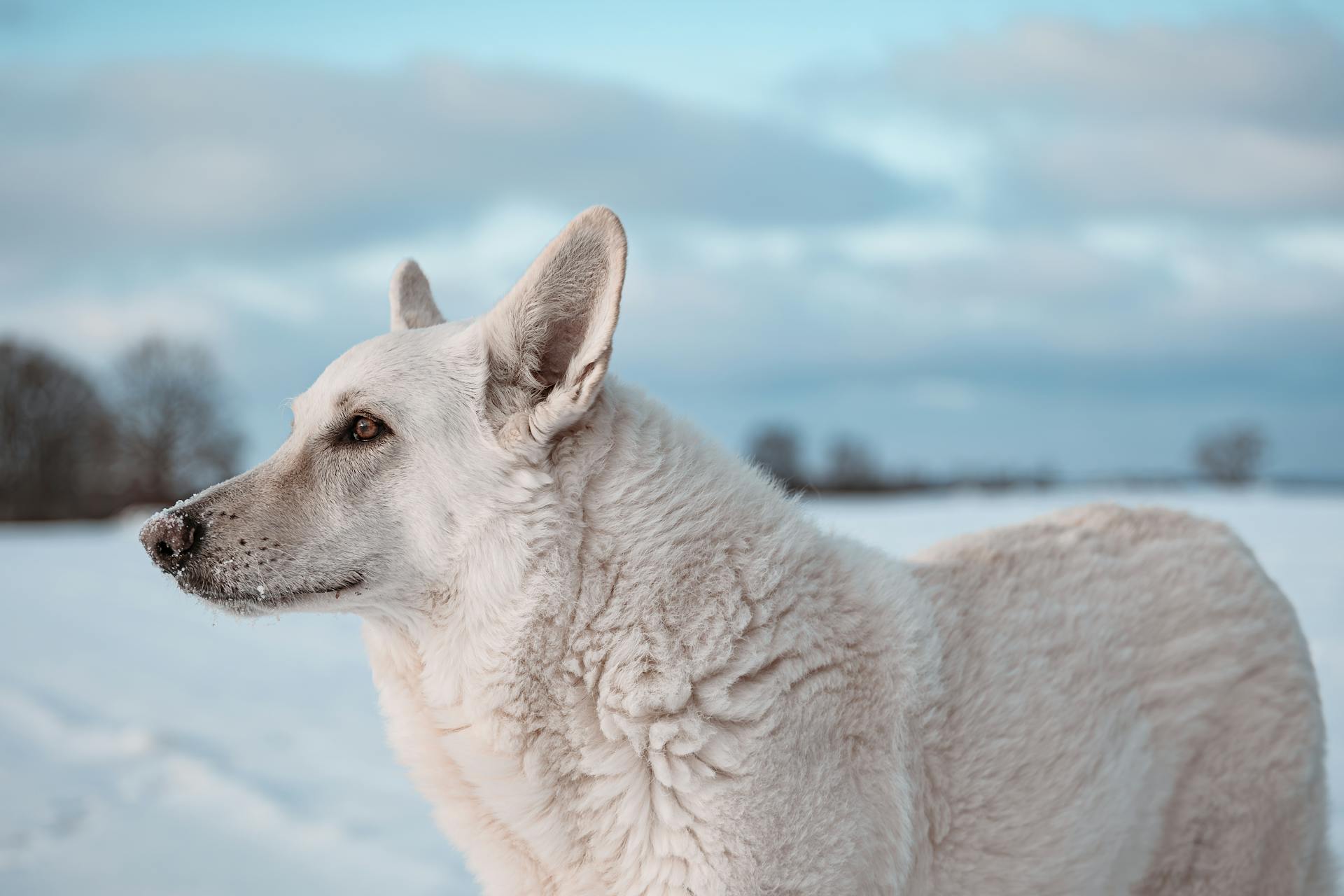
You should be careful not to overfeed your King Shepherd, as they can easily become overweight and put pressure on their joints. A mix of wet dog food with kibble is said to decrease the risk of Gastric Torsion.
King Shepherds need a lot of food, so be prepared to budget a healthy amount for that. They can go through a bag or more of food per month, especially when they're puppies.
Obesity is a major concern for King Shepherds, so it's essential to practice strict portion control and never let them free-feed. This means measuring out their food carefully and avoiding giving them too many treats or scraps.
A high-quality dog food with real meat as the first ingredient is crucial for your King Shepherd's health. Look for a food that's high in protein (over 30%), with a healthy amount of fat (15%) and fiber (5%).
Recommended read: Best Dog Food for Rhodesian Ridgeback
Grooming and Training
The white King Shepherd's grooming needs are quite specific. They have a thick double coat that requires regular upkeep to stay healthy and look its best.
Brushing should be done at least once or twice a week to remove loose hairs, prevent matting, and distribute natural oils for a healthy shine. During shedding seasons, daily brushing is necessary to manage the increased shedding.
A bath every few months, or whenever they get particularly dirty, is sufficient, as overbathing can strip their coat of natural oils and lead to dry, itchy skin. Always use a dog-specific shampoo to maintain the pH balance of their skin.
Broaden your view: Chinese Shar Pei Shedding
Grooming
Grooming is a crucial aspect of King Shepherd care. Regular brushing is essential to prevent matting and tangling, especially during seasonal changes.
You'll need to brush your King Shepherd at least once a week, but daily brushing is recommended to manage their thick double coat. During shedding seasons, which typically occur in spring and fall, you may need to brush your King Shepherd daily.
Their thick coat requires regular upkeep to stay healthy and look its best. Regular grooming also allows you to check for any skin issues or parasites.
Additional reading: Rough Collie Grooming Styles
A bath every few months is sufficient, unless they get particularly dirty. Overbathing can strip their coat of natural oils and lead to dry, itchy skin. Always use a dog-specific shampoo to maintain the pH balance of their skin.
Daily brushing is also an opportunity to monitor any lumps and infections that may develop. Keep their ears clean by wiping them out with a damp cloth at least once a week and drying them thoroughly.
Their teeth need to be brushed daily, and their nails trimmed whenever they get too long. Regular grooming will help prevent these issues and keep your King Shepherd happy and healthy.
Training
Training is a crucial part of owning a King Shepherd. They're eager to learn and make great companions for first-time dog owners.
The key to successful training is consistency and positive reinforcement. A little praise goes a long way for this breed. They quickly pick up commands and thrive on attention.
Socialization is equally important, especially since they can inherit a guarding streak from their parents. Exposing them to unfamiliar people and other dogs from an early age will help prevent over-aggression or overprotectiveness.
Teaching basic commands like sit, stay, and leave it is essential, and reinforcing them regularly will help solidify good behavior. As they become more confident, you can introduce more complex tricks and commands.
One of the most important things to teach a King Shepherd is how to walk on a leash. Their boisterous nature can make them strong and difficult to control if they're not trained properly.
Consider reading: Will a Great Pyrenees Attack an Intruder
Size and Appearance
The King Shepherd is a large breed, measuring between 25 and 32 inches tall from paw to shoulder.
They weigh between 90 and 140 pounds, making them a giant dog.
Their size is larger than both of their parents, with the females being smaller than the males in both height and weight.
The King Shepherd has a long muzzle and a large square head, giving them a charming appearance.
Their voluptuous fur adds to their teddy bear-like cuteness, and their large triangle-shaped ears are generally erect, giving them an alert look.
Size and Appearance
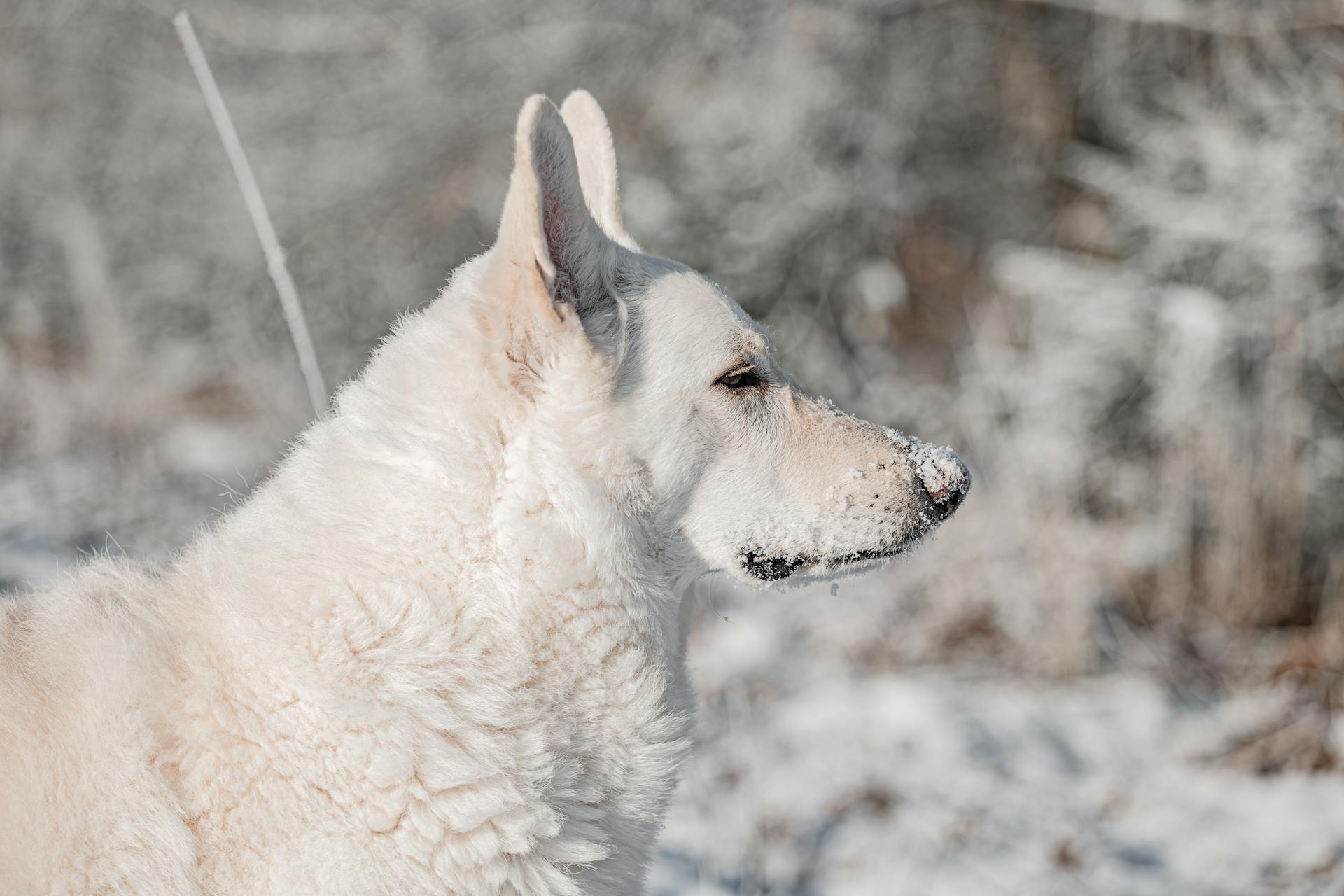
The King Shepherd is a giant dog, measuring between 25 and 32 inches tall, from paw to shoulder, and weighing between 90 and 140 pounds.
His size is quite impressive, especially when you consider that he's larger than both of his parents. In fact, the females will be slightly smaller than the males, but overall, they both have a similar appearance.
One of the distinctive features of the King Shepherd is his long muzzle and large square head. His voluptuous fur adds to his teddy bear-like cuteness, making him a lovable companion.
The King Shepherd's large triangle-shaped ears are generally erect, giving him an alert look. This, combined with his powerful build and muscles, makes him agile and quick despite his large size.
His straighter and less sloped back compared to his German parent gives him a larger and more proportioned look. This is quite noticeable, especially when you compare him to his parents.
Here's an interesting read: What Does a Golden Retriever Dog Look like
Coat Colors
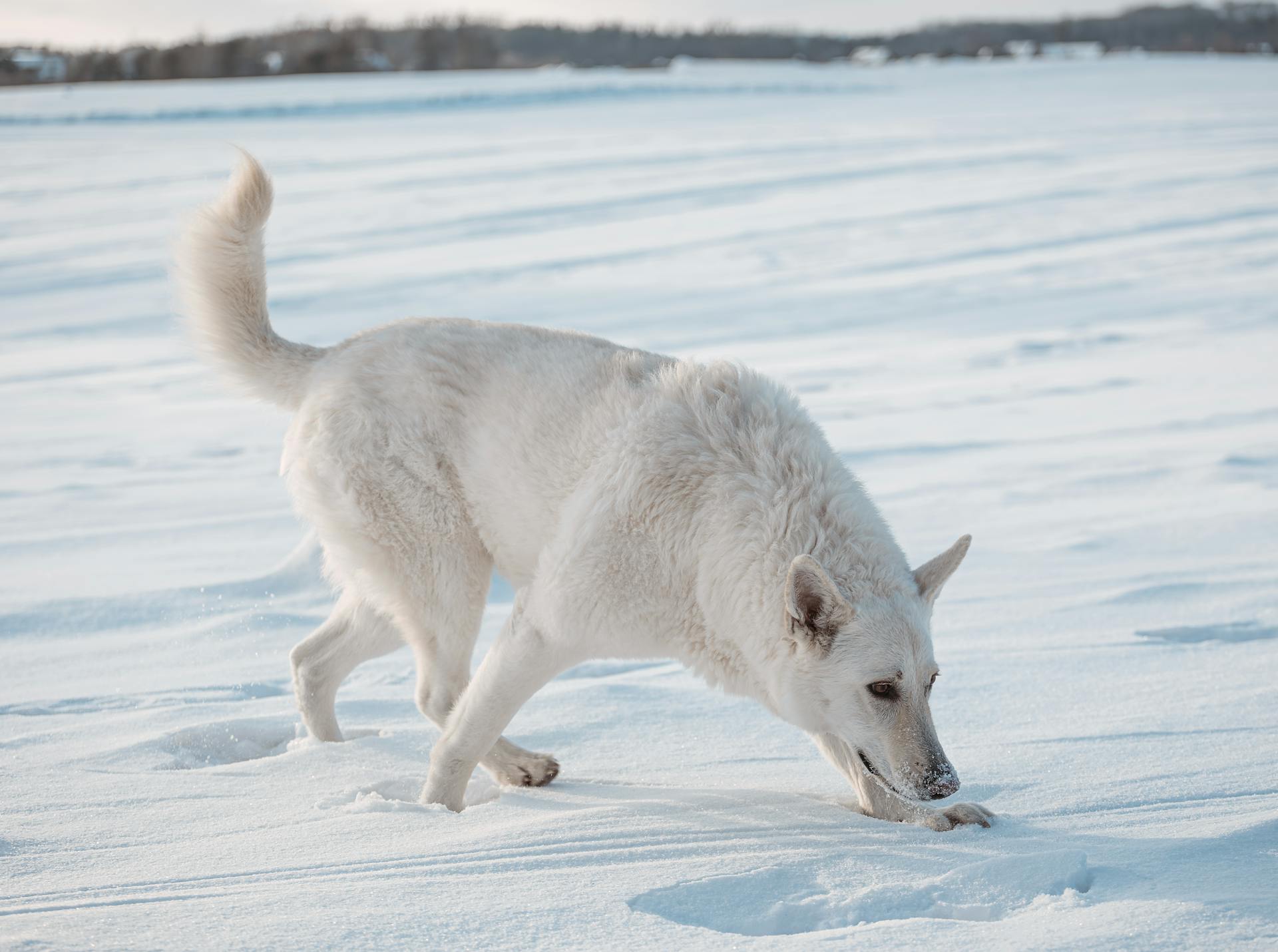
The King Shepherd's coat colors are truly stunning. They come in a variety of rich colors, including sable, bi-colored, black saddle with red, tan, gold, or cream, and solid black.
Their coat colors can also be a combination of these, making each dog unique.
Their coat colors include a diluted color such as silver or blue, or complete white, although these are considered undesirable according to the breed standards.
Crossbreeds Parentage
The King Shepherd's size and appearance can be attributed to its crossbreed parentage. The term crossbreed refers to a dog that has parents from different breeds.
The King Shepherd's parentage includes a Shiloh Shepherd, which is not considered a purebred dog as it is a relatively new breed. They also have some Akita and Great Pyrenees mixed in somewhere along the line.
The Shiloh Shepherd's influence on the King Shepherd's size and appearance is significant, as it is a large breed dog. The Akita and Great Pyrenees also contribute to the King Shepherd's size, as they are both known for their large stature.
The King Shepherd's unique combination of breed characteristics results in a dog that is often larger than a standard Shepherd dog. This mix of breeds also affects the King Shepherd's coat type and color.
Frequently Asked Questions
How rare is a King Shepherd?
The King Shepherd is a rare breed, recognized by smaller organizations but not yet by the American Kennel Club. Its rarity makes it a unique and sought-after companion for dog enthusiasts.
What two breeds make a King Shepherd?
The King Shepherd is a hybrid breed that primarily combines the German Shepherd with the Shiloh Shepherd.
How do you tell if your dog is a King Shepherd?
To identify a King Shepherd, look for a dense, medium-length coat with a regal feathering appearance, often in a combination of red, black, brown, fawn, or sable colors. If your dog inherits the coat color of a German Shepherd parent, it may be a King Shepherd.
What is a King Shepherd vs German Shepherd?
A King Shepherd is a hybrid dog breed that combines German Shepherd ancestry with other breeds, whereas a German Shepherd is a purebred breed. While they share similarities, King Shepherds have a unique genetic mix that sets them apart from their German Shepherd counterparts.
How long can a king shepherd live?
King shepherds typically live between 11 and 13 years, with some hybrids potentially living longer due to their unique genetic makeup.
Featured Images: pexels.com
